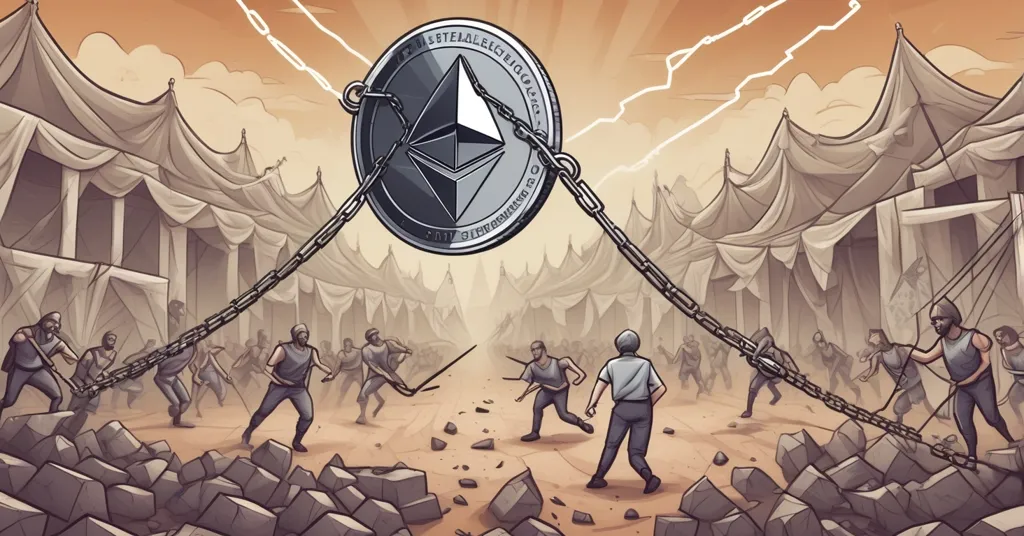Ethereum’s Core Values Under Threat: A Veteran’s Stark Warning

We’re at War, and Our Values Are at Stake: A Veteran Calls Ethereum’s Cultural Drift a Threat
Ameen Soleimani, a veteran Ethereum developer, has raised critical concerns about Ethereum’s drift from its core values. In a compelling social media thread, he highlights the network’s increasing reliance on centralized stablecoins, engagement with political systems, and the legal challenges facing permissionless innovation. Soleimani’s insights, rooted in his extensive experience, offer a stark warning about Ethereum’s future.
- Ethereum’s reliance on centralized stablecoins
- Engagement with political systems
- Legal challenges to permissionless innovation
- Dependence on ETH price for security
Soleimani’s critique, shared on April 17, underscores Ethereum’s focus on abstract ideals over practical realities. He notes that over $100 billion in centralized stablecoins like Tether (USDT) and USD Coin (USDC) are deployed on the network, which he argues undermines Ethereum’s narrative of decentralization. These stablecoins, controlled by private companies, introduce counterparty risk and regulatory oversight, conflicting with Ethereum’s vision of a decentralized financial system.
Permissionless innovation, the ability to develop and deploy applications without needing permission from a central authority, is at the heart of Ethereum’s ethos. However, Ethereum’s growing reliance on centralized stablecoins challenges this ideal. Centralized stablecoins like USDT and USDC are digital currencies controlled by private companies, introducing risks that go against the decentralized nature of blockchain technology.
Over half of Ethereum’s nodes are hosted in countries with established crypto regulations, and members of the Ethereum Foundation are actively engaging with policymakers globally. This political engagement, while necessary for navigating regulatory landscapes, raises questions about Ethereum’s commitment to political neutrality. Ethereum’s love affair with stablecoins is like inviting a bank to a blockchain party – it’s a bit of a buzzkill.
The legal challenges facing permissionless innovation on Ethereum are highlighted by the case of Tornado Cash. The privacy-focused protocol and its developers, Roman Storm and Alexey Pertsev, have faced sanctions and charges from the U.S. Office of Foreign Assets Control (OFAC) for alleged money laundering. This case illustrates the tension between Ethereum’s ethos of open innovation and the realities of operating in a regulated world. Have you ever wondered how the price of ETH affects Ethereum’s security?
Soleimani emphasizes the critical role of ETH’s price in Ethereum’s proof-of-stake security model. In this model, validators stake their ETH to participate in network consensus. A significant drop in ETH’s price could reduce incentives for validators, potentially making the network more vulnerable to attacks. ETH’s price is not just a market metric; it is a core part of how the network stays resilient.
As Ethereum continues to evolve, Soleimani questions whether the community can reconcile these contradictions and move forward effectively. He believes that defending permissionless innovation now requires more than idealism; it demands legal foresight, active engagement, and a deeper understanding of the risks that come with building in a regulated world.
Despite these challenges, Ethereum remains a cornerstone of decentralized finance (DeFi) and a platform for innovation. Recent developments in the legal landscape, such as the Department of Justice’s shift in focus away from targeting developers and the Fifth Circuit Court of Appeals’ ruling that Tornado Cash software is not property, may influence the resolution of these challenges. These shifts could set important precedents for how developers and open-source projects are treated under the law, impacting the broader crypto ecosystem.
As Ethereum navigates these complex issues, the community’s response will be crucial. Balancing the ideals of decentralization and permissionless innovation with the realities of regulatory compliance and market dynamics will be a defining challenge for Ethereum in the years to come.
Key Takeaways and Questions
- What are the main criticisms Ameen Soleimani has about Ethereum?
Soleimani criticizes Ethereum’s detachment from practical concerns, reliance on centralized stablecoins, engagement with political systems, legal risks associated with permissionless innovation, and dependence on ETH’s price for network security.
- How does Ethereum’s use of centralized stablecoins impact its decentralization narrative?
The use of centralized stablecoins like USDT and USDC introduces counterparty risk and regulatory oversight, which conflicts with Ethereum’s broader goal of decentralization, as these assets are controlled by private companies.
- What legal challenges does permissionless innovation face on Ethereum?
The case of Tornado Cash demonstrates the legal risks, as its developers were sanctioned and charged with money laundering and other offenses, highlighting the tension between permissionless innovation and regulatory compliance.
- Why is the price of ETH critical for Ethereum’s security?
ETH’s price is essential for the proof-of-stake model, as it affects the incentives for validators to stake and maintain network security. A significant drop in ETH’s price could reduce these incentives and make the network more vulnerable to attacks.
- Can Ethereum reconcile its internal contradictions and move forward?
Soleimani believes Ethereum can adapt by recognizing and addressing its internal contradictions, drawing on past examples of community adaptation and emphasizing the need for legal foresight and broader engagement with real-world systems.
“Ethereum’s reliance on abstract ideals and aspirational messaging often obscures the real challenges facing the network.” – Ameen Soleimani
“Defending permissionless innovation now requires more than idealism. It demands legal foresight, active engagement, and a deeper understanding of the risks that come with building in a regulated world.” – Ameen Soleimani
“ETH’s price is not just a market metric. It is a core part of how the network stays resilient.” – Ameen Soleimani



